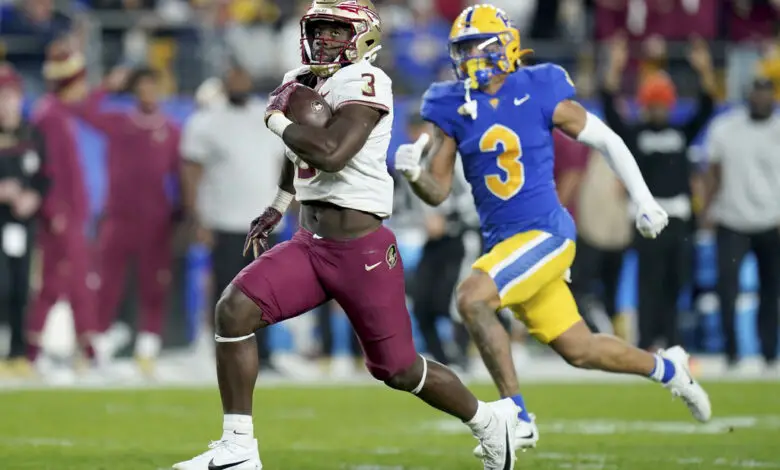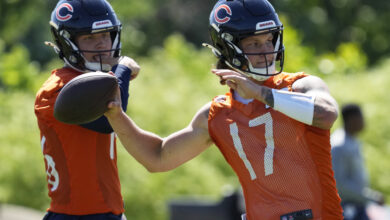
2024 NFL Draft Rankings: Running Backs
Previous Rankings in this series:
The NFL Draft begins this Thursday, and the Chicago Bears won’t be looking for a running back. Last year, they weren’t looking for a running back, but they took the best player when Roschon Johnson fell to them. The running back position has been less valued in the NFL lately, and more talent is falling later in mock drafts than expected. If the Bears find a way to add picks, or if some of their favorite prospects go undrafted, one of these players might end up on the Bears. There’s a lot of talent in this draft class, and I’ve ranked them here.
D'Andre Swift I believe is gonna be a very nice addition to our backfield#ChicagoBears #BearsNation pic.twitter.com/4eyAQlFlDY
— Zach ✞ (@DaBearsZach) April 18, 2024
The Bears have Khalil Herbert entering a contract year, and Johnson joins him as the team’s two returning running backs with a recorded carry in 2023. Newcomer and former NFC North opponent D’Andre Swift has signed a sizable contract with the Bears and could take over starting duties. None of the Bears’ running backs have elite speed, but they all have more than enough speed to be dangerous. The Bears struggled with running back injuries last year, and they may want to add depth as a precaution. They may also want to add a more top-end speed back or bring in a more agile runner. There’s a reason to add a running back, but will it be from the draft?
1. Trey Benson FSU 6’0″ 216lbs
Florida State’s Trey Benson has everything I want in a running back, but he needs it all to be more consistent. His home-run speed and fluid change-of-direction movement allow him to make quick cuts and choose the best angles. Benson loses momentum when making cuts but has the acceleration to help recover. Benson is only ok at blocking, and his routes in college were limited to short flats and screens. He still showed good enough catching and body control to give me confidence that he could stay on the field for third downs. Benson also has good vision in locating holes to burst through and keeps his legs churning after contact to keep the pile moving. He’s a well-rounded back with the third-best 40-yard time for his position, but he must stay healthy to excel in the NFL.
If you’re even with Trey Benson, you’re getting smoked. Injuries took his first two years, but Benson set the single-season PFF record for forced missed tackle rate in 2022. The RB1 of this year’s class. pic.twitter.com/2yeA2H6YoH
— Kyle Lindemann (@LuckIsMadeFF) March 25, 2024
2. Jonathan Brooks Texas 6’0″ 216lbs
Jonathan Brooks could get faster, but his initial burst and balance make him great, not elite speed. Brooks deploys a powerful stiff arm or uses lower body strength to ensure the first defender rarely brings him down alone. He’s a fluid mover who changes direction well and is patient in the backfield. Brooks’ decision-making isn’t top-tier due to limited time as the starter, and he never had to carry a team on his back. He needs to be stronger for short-yardage consistency, and he needs to be faster for consistent home-run ability. Despite those concerns, he’s a phenomenal blocker and talented enough to impact any team immediately.
3. Ray Davis Kentucky 5’8″ 211lbs
Re’Mahn “Ray” Davis is one of my favorite prospects from this class, and he reminds me of Maurice Jones-Drew. He runs with phenomenal balance from his lower center of gravity and is decisive both behind the line and at the next level. Davis has proven he can handle a bell-cow role, and he lowers his shoulder and fights for extra yards. He lacks that final gear for elite speed, and his pass protection is awful, but he’s a well-rounded, talented prospect outside of those issues. Davis even had a more diverse route tree and showed multiple times that he’d be a threat in the passing game. I expect big things out of Davis at the next level.
4. Jaylen Wright Tennessee 5’10” 210lbs
Jaylen Wright has to-the-house speed, but he must bulk up and maintain that speed to be a top-tier player in the NFL. He runs upright too much and needs more contact power, and paired with a slighter frame, he’s bound to have struggles. That said, Wright’s a patient back who bursts through the line and chooses the right angles to get away. He’s a fluid mover who can change direction smoothly or make sharp cuts and jukes to fake out defenders. Wright is an above-average blocker who gets his pads low at the contact point, whether blocking or if he’s running the ball. Wright runs with good balance and does well as a receiver as well. I like Wright as a top running back at the draft Thursday, and I’d be surprised if he weren’t among the top five selected.
Reminder: Jaylen Wright can FLY💨
— PFF College (@PFF_College) April 19, 2024
5. Blake Corum Michigan 5’8″ 205lbs
See Davis’ draft profile, but remove the pass-catching ability. Blake Corum has a similar style to Kentucky’s Davis, but Corum has a better short-area burst. I also give Corum credit as a better pass protector, but he lunges and still needs to improve. In the passing game, Corum was underutilized but still managed to drop several passes. He’s more quick than fast, but he’s decisive and has the vision to help maneuver through traffic. Corum needs to add more weight to be more effective in short-yard scenarios, but he’s got enough power to break arm tackles consistently. I have concerns for him but still have him rounding out my top five.
6. Dillon Johnson Washington 6’0″ 217lbs
I need help understanding the lack of respect Dillon Johnson receives on most draft boards because he’s being heavily undervalued. Johnson has the speed that, paired with his quick decision-making and angle selection, threatens big plays consistently. Granted, his speed isn’t top-tier, but it’s more than serviceable. His balance is phenomenal. Johnson powers through contact, making it difficult for defenders to tackle alone. He has a solid stiff arm and can cut, juke, truck, or get slippery and hard to tackle. NFL coaches can also keep Johnson on the field for third down because Johnson is a solid blocker and a good pass catcher. He’s a well-rounded running back, but his speed isn’t elite, and his vision and decision-making need to improve. There are technique concerns with blocking especially, but Johnson has a good toolkit and a chance to be great.
7. Marshawn Lloyd USC 5’9″ 220lbs
8. Bucky Irving Oregon 5’9″ 192lbs
9. Audric Estime Notre Dame 5’11” 221lbs
10. Braelon Allen Wisconsin 6’1″ 235lbs
11. Carson Steele UCLA 6’1″ 225lbs
12. Miyan Williams Ohio St. 5’8″ 229lbs
13. Isaac Guerendo Louisville 6’0″ 221lbs
14. Rasheen Ali Marshall 5’11” 206lbs
15. Kimani Vidal Troy 5’8″ 213lbs
16. Jawhar Jordan Louisville 5’9″ 193lbs
17. Brandon Thomas Memphis 5’10” 210lbs
18. Cody Schrader Missouri 5’8″ 202lbs
19. Kendall Milton Georgia 6’1″ 225lbs
20. Austin Jones USC 5’9″ 211lbs
21. Tyrone Tracy Jr. Purdue 5’11” 209lbs
22. Josh Williams LSU 5’9″ 203lbs
23. Frank Gore Jr Southern Mississippi 5’8″ 201lbs
24. Isaiah Davis South Dakota St. 6’0″ 218lbs
25. Jase McClellan Alabama 5’10” 221lbs
26. Emani Bailey TCU 5’7″ 202lbs
27. Dylan Laube New Hampshire 5’10” 211lbs
28. Noah Cain LSU 5’11” 220lbs
29. Daijun Edwards Georgia 5’10” 207lbs
30. Jalen Berger Michigan St. 6’1″ 215lbs
31. George Holani Boise St. 5’10” 208lbs
32. Michael Wiley Arizona 5’10” 210lbs
33. Keilan Robinson Texas 5’8″ 191lbs
34. Will Shipley Clemson 5’11” 206lbs
35. John Emery Jr LSU 6’0″ 224lbs
For more detailed coverage listen to The Chicago Bears Den Podcast.


